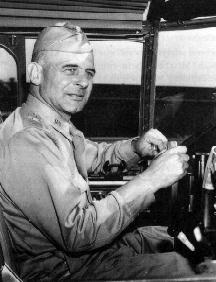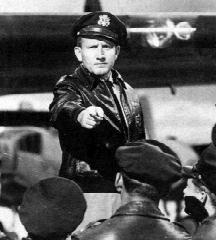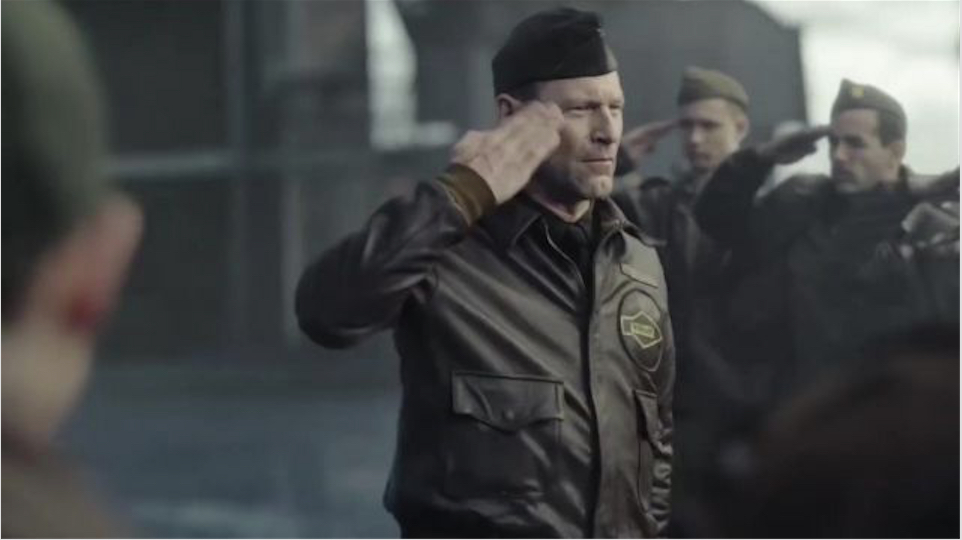

Rank, duty position and unit at time of action:
Lieutenant Colonel, Commanding Officer, 17th Bombardment Group, US Army Air Force
War:
World War II
Place and date of action:
Tokyo, Japan, 18 April 1942
Portrayed by:


Rank, duty position and unit at time of action:
Lieutenant Colonel, Commanding Officer, 17th Bombardment Group, US Army Air Force
War:
World War II
Place and date of action:
Tokyo, Japan, 18 April 1942
Portrayed by:

In the film:

In the film:
Midway (2019)
DOOLITTLE, JAMES H. (Air Mission)
Rank and organization: Brigadier General, U.S. Army. Air Corps. Place and date: Over Japan. Entered service at: Berkeley, Calif. Birth: Alameda, Calif. G.O. No.: 29, 9 June 1942. Citation: For conspicuous leadership above the call of duty, involving personal valor and intrepidity at an extreme hazard to life. With the apparent certainty of being forced to land in enemy territory or to perish at sea, Gen. Doolittle personally led a squadron of Army bombers, manned by volunteer crews, in a highly destructive raid on the Japanese mainland.
Doolittle led a special strike force of sixteen B-25 Mitchell medium bombers launched from the deck of the aircraft carrier USS Hornet (a feat for which neither the bombers nor the carrier were designed) to strike the Japanese mainland in retaliation for Pearl Harbor. The plan was for the B-25s to land in friendly territory in China, but the carrier was spotted by a Japanese patrol boat while nearly half again farther from Japan than the intended launching point. Although the Japanese boat was promptly sunk by the Hornet's escorting destroyers, it was impossible to determine whether or not it had radioed any warning, and Doolittle decided to launch from the extra distance, realizing that they would not have the fuel to reach the airfields in China. Two bombers crashed in Japanese-held territory and their crews were captured, and one landed in Russia (then a neutral country in the war with Japan) and its crew interned for over a year. The remaining thirteen crashed in friendly territory in China, with one crewman killed and the remaining sixty-four eventually rescued, including Doolittle himself. But the airstrikes on the Japanese homeland, including Doolittle's strike on Tokyo itself, provided a much needed boost to American morale. Although the damage inflicted was nominal, the psychological effect on the Japanese populace and the high command was so disruptive that Admiral Isoroku Yamamoto redeployed his carrier fleet to defend the homeland against further raids by seeking to destroy the US carrier fleet, resulting in his defeat (and the sinking of four of the six Japanese carriers that had attacked Pearl Harbor) at the Battle of Midway six weeks later. In addition to the Medal of Honor, Doolittle was jumped over the rank of full colonel and promoted directly to Brigadier General.
Doolittle was a flight instructor during the First World War, and remained in the reserves while attaining his Masters and PhD in aeronautical engineering at MIT and then flying for the aviation division of Shell Oil. He held several flight speed and endurance records when he returned to active duty a year before the US entered World War II. After the Tokyo raid, he rose to command the 8th Air Force, only one of two reservists to command a numbered air force in the war (the other being Major General Claire L. Chennault who commanded the 14th Air Force in the China-Burma-India Theater of Operations after his American Volunteer Group of the Chinese Air Force, a.k.a the Flying Tigers, was absorbed into the USAAF).
The film Thirty Seconds Over Tokyo was based on the
autobiography, and shown through the perspective, of Captain Ted
W. Lawson (played in the film by Van Johnson), an aircraft
commander during the Doolittle Raid who lost a leg when his B-25
crashed in China. Although the film dwelt heavily on Lawson's
relationship with his wife, Spencer Tracy's Doolittle was a
major character in the film and it did cover the preparations,
raid and aftermath with as much detail and accuracy as could be
given considering that the war was still going on at the time.
[After rereading Lawson's book and revisiting the film in 2001
to compare and contrast it with Pearl Harbor, the
authors have to rank this film as nearly up there with Gettysburg, in terms of both
historical accuracy and faithfulness to the original book.]
Doolittle and his raiders were also depicted as a substantial
part of the 2019 film Midway; the earlier 1976 Midway
film had begun with the same real-life footage of the launch of
the raid from the Hornet that was incorporated into Thirty
Seconds over Tokyo, which illustrates how inextricable the
two events are in history. The actual raid on Tokyo getting just
about the real time of Lawson's titular "Thirty Seconds" on
screen in both films, like Lawson in the film version of his
memoirs, much more of Aaron Eckhart 's appearance as Doolittle
deals with his own aftermath of the mission and his difficulty
in convincing Chinese guerrillas and civilians of his identity
and convincing them to take him to safety. Doolittle's initial
encounter with Chinese guerrillas closely follows his account of
the event in his autobiography. (More on that below.) One
incident from his account, between the raid and the encounter,
which didn't make it into the film that might have added to it,
was a conversation between Doolittle and Sergeant Paul Leonard,
his flight engineer, as they stand among the scattered wreckage
of their B-25. The despondent Doolittle is convinced that the
raid was a failure and that he had nothing in his future but a
Court Martial and incarceration at the military prison at Fort
Leavenworth. Leonard reassures him, correctly predicting his
Medal of Honor and two-rank promotion.
Another film, The Purple Heart (1945) was a reconstructed account of the fate of one of the other B-25 crews of the Doolittle Raid who were captured by the Japanese, recounting their trial and execution for war crimes, but Doolittle himself was not depicted in that film.
Doolittle was also portrayed during the Tokyo mission by Alec
Baldwin in Pearl Harbor (2001), but Baldwin's depiction of
Doolittle as a foul-mouthed, condescending, arrogant egotist
(which has drawn the wrath of just about everyone living who
knew the real Jimmy Doolittle) is only one of the many
historical distortions and inaccuracies which place this turkey
in the Hollywood Abominations category. The title of Doolittle's
own autobiography published in 1991, I Could Never Be
So Lucky Again, is by itself sufficient testament to his
humility.